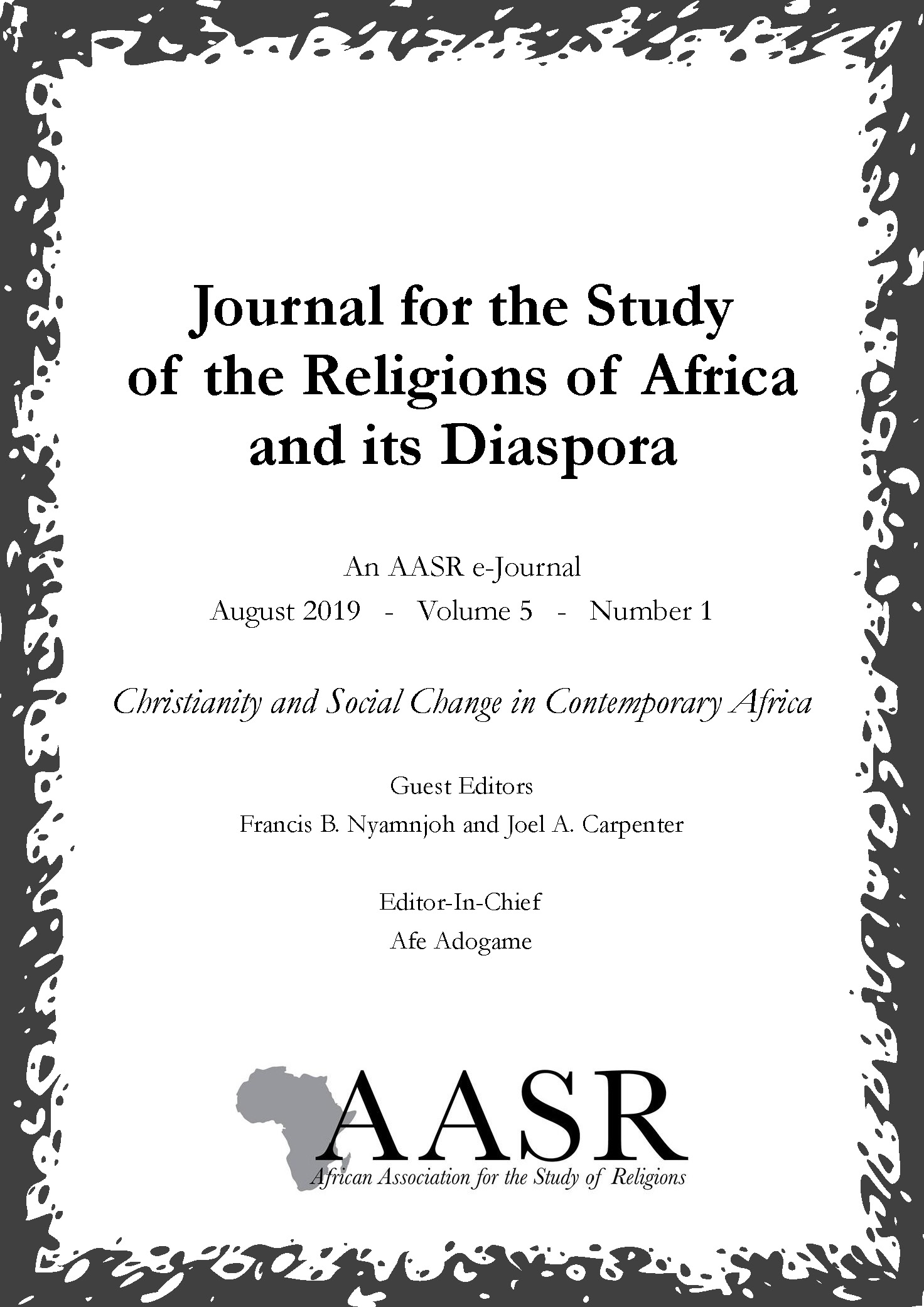Women without Limits and Limited Women Pentecostal Women Navigating between Empowerment and Disempowerment in Kenya
Main Article Content
Keywords
Pentecostalism, Women Empowerment, Limits, Patriarchal Imaginaries, Sexed Bodies
Abstract
Neo-Pentecostalism has been characterised as offering freedoms and empowerment for women in the Global South, Africa in particular. Despite the limitations on freedom, women are able to negotiate, navigate and contest their (dis)empowerment in the context of rapidly modernized but heavily patriarchal societies, such as Kenya, Zimbabwe and South Africa. This article explores how women in Jubilee Christian Centre (JCC) and the Ministry of Repentance and Holiness (MRH), popular Neo-Pentecostal Churches, navigate and negotiate between empowerment and disempowerment positions in their spiritual and personal lives. I seek to point out the seemingly invisible yet critical threads associated with gender and religion and how these strands shape women’s lives. These threads are associated with self-understanding, self-definition, personal and collective empowerment or disempowerment and the building of self-esteem.
Article Metrics Graph
References
Kalu, Ogbu. (2008). African Pentecostalism: An Introduction. New York: OUP. https://doi.org/10.1093/acprof:oso/9780195340006.001.0001
Griffith, Marie. (1997). God's Daughters: Evangelical Women and the Power of Submission. Los Angeles: University of California Press.https://doi.org/10.1525/9780520926172
Maluleke, Tinyiko, and Sarojini Nadar. (2002). 'Breaking the Covenant of Violence against Women'. Journal of Theology for Southern Africa, Issue 115: 5.
Martin, David. (2005). On Secularization: Towards a Revised General Theory. Aldershot: Ashgate.
-----------------. (2002). Pentecostalism: The World Their Parish. Oxford: Blackwell.
Mate, Rekopantswe. (2002). 'Wombs as God's Laboratories: Pentecostal Discourses of Femininity in Zimbabwe'. Africa, 72:4: 549-658.https://doi.org/10.2307/3556701
Meyer, B. (1998). '"Make a Complete Break with Past": Memory and Post-colonial Modernity in Ghanaian Pentecostalism Discourses'. Journal of Religion in Africa 28:3: 316 - 349. https://doi.org/10.2307/1581573
Mwaura, P. N. (2005). 'Gender and Power in African Christianity: African Instituted Churches and Pentecostal Churches'. In African Christianity: An African Story, pp. O. Kalu (Ed.), y. Pretoria: University of Pretoria. https://doi.org/10.3366/swc.2004.10.2.160
Mwaura, P. N. (2002). 'A Burning Stick plucked out of the Fire: The Story of Rev. Margaret Wanjiru of Jesus is Alive Ministries.' In Hidden Histories of Women of Faith in Africa, pp. 202- 224. Edited by I. Phiri and S. Nadar. (Eds.), Pietermaritzburg: Cluster Publications.
Parsitau, D.S and Mwaura, P. N. (2013). 'Gendered Charisma: Women in Mission in Neo- Pentecostal and Charismatic Movements in Kenya'. In Putting Names with Faces: Women's Impact in Mission History, pp. 123-146. Edited by C. Lieneman-Perrin, et. al. Nashville: Abingdon Press.
Parsitau, D.S (2012). 'Agents of Gendered Change: NGOs and Pentecostal Movements as Agents of Social Transformation in Urban Kenya'. In The Pentecostal Ethic and the Spirit of Development: Churches, NGO and Social Change in Neo-Liberal Africa, pp. 203-220. Edited by D. Freeman. New York: Palgrave Macmillan. https://doi.org/10.1057/9781137017253_9
Parsitau, D.S. and Mwaura, P.N, (2012). 'Perceptions of Women's Health and Rights in Christian New Religious Movements in Kenya.' In African Traditions in the Study of Religion in Africa: Emerging Trends in Indigenous Spirituality and the Interface with Other Worlds, pp. 175-186. Edited by A. Adogame. Aldershot: Ashgate Publishers.
Parsitau, D.S. and Mwaura, P.N. (2010). "'Gospel without Borders:" Gender Dynamics of Transnational Religious Movements in Kenya and the Kenyan Diaspora'. In Religions Crossing Boundaries: Transnational Religious Dynamics in Africa and the New African Diaspora, pp.185-210. Edited by Afe Adogame and Jim Spickard. Leiden: Brill. https://doi.org/10.1163/ej.9789004187306.i-280.63
Parsitau, D.S. (2011). ''Arise Oh Ye Daughters of Faith: Pentecostalism, Women and Public Culture in Kenya'. In Christianity and Public Culture in Africa, pp. 131- 148. Edited by Harri Englund. Athens, OH: Ohio University Press.
Parsitau, D. (2016). 'Prophets, Power, Authority and the Kenyan State: Prophet David Owuor of the National Repentance and Holiness Ministry'. In Religious Freedom and Religious Pluralism in Africa: Prospects and Limitations, pp. 233-256. Edited by P. Coertzen, M. G. Christian, and L. Hansen. Stellenbosch: SUN Media.
Parsitau, D.S. (2014). 'Embodying Holiness: Gender, Sex, Bodies and Patriarchal Imaginaries in a Neo-Pentecostal Church in Kenya'. In Body Talk and Cultural Identity in the African World, pp. 181-201. Edited by Augustine Agwuele. Sheffield: Equinox Publishers.
Phiri, Isabel and Nadar, Sarojini. (2006). 'What's in a Name: Forging a Theoretical Framework for African Women's Theologies.' Journal of Constructive Theology 12:2: 5-24.
Sarojini, Nadar. (2003). 'Power, Ideology and Interpretations: Womanist and Literal Perspectives on Esther as a resource for Gender equality-Social Transformation'. Ph.D. thesis, University of Natal.
Sarojini, Nadar. (2004). 'On Being the Pentecostal Church'. The Ecumenical Review 56 (July 2004): 354-367. https://doi.org/10.1111/j.1758-6623.2004.tb00521.x
Sarojini, Nadar and C. Potgieter. (2010). 'Liberated through Submission, the Worthy Woman's Conference as a Case Study of Formenism'. Journal of Feminist Studies in Religion 26:2: 1-151. https://doi.org/10.2979/fsr.2010.26.2.141
Soothill, J.E. (2007). Gender, Social Change and Spiritual Power: Charismatic Christianity in Ghana. Leiden: Brill.https://doi.org/10.1163/ej.9789004157897.i-264


